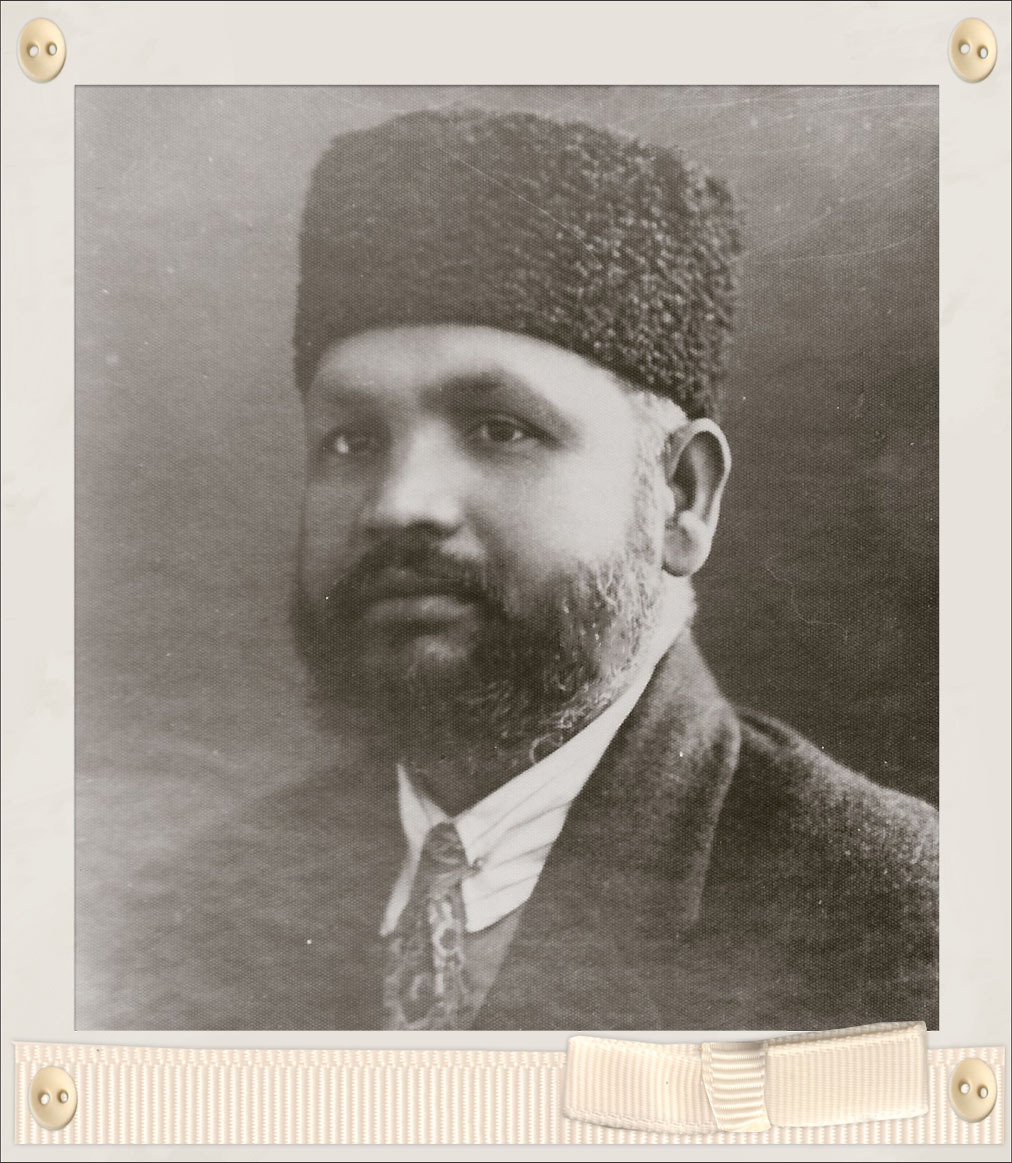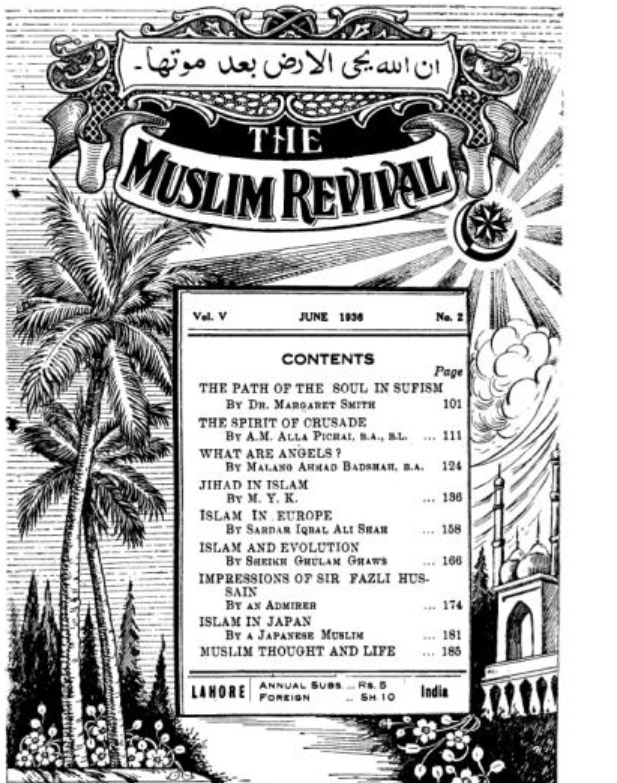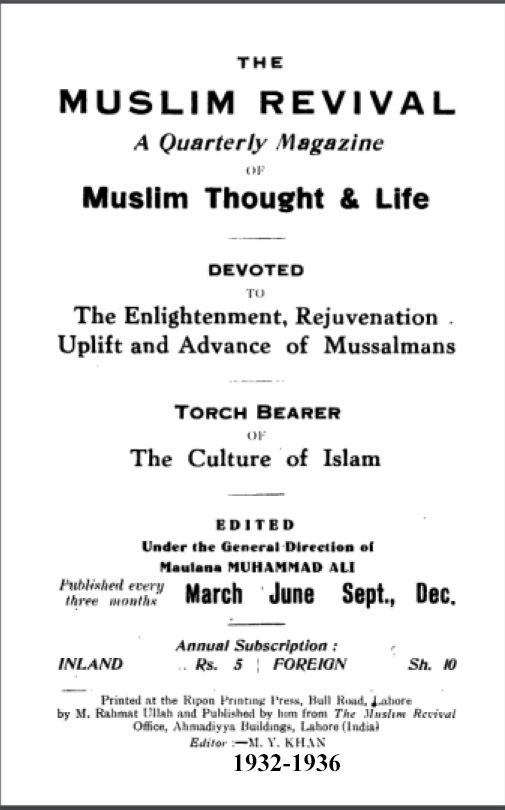JIHAD IN ISLAM – Part 2
TREATY OF JERUSALEM
This respect for the conscience of others was not confined to the Prophet, the Muslamans in general caught the same spirit and respected the religious susceptibilities of others to the point of punctiliousness. It is recorded that on the occasion of the occupation of Jerusalem by Muslims, Caliph Umar refused to say his prayer in the church of the Resurrection or the church of Constantine, notwithstanding the insistence of the Christian Patriarch to do so. If once he said his prayers there, he apprehended, some Muslims might take advantage of it and take possession of the church on the pretext that since he had prayed there, it was an Islamic place of worship.
The Treaty of Aljabia according to which Jerusalem was ceded to the Muslims likewise guaranteed religious freedom to the fallen foes. This is how it runs as given in Muir’s The Caliphate:
“In the name of the Most Merciful God. This is the treaty for the people of Aelia. This is the favour which the servant of God, the Commander of the Faithful grants to the people of Aelia. He gives them the assurance of the preservation of their lives and properties, their churches and crosses, of those who set up, who display and who honour these crosses. Your churches will not be transformed into dwellings nor destroyed, nor will anyone confiscate anything belonging to them, nor the crosses or belongings of the inhabitants.
“There will be no constraint in the matter of religion, nor the least annoyance. The Jews will inhabit Aelia conjointly with the Christians and those who live there will require to pay the poll-tax, like the inhabitants of other towns. The Greeks are to leave the town but will have a safe conduct until they reach a place of security. Still those who prefer to remain may do so on condition of paying the same poll-tax as the rest. If any of the people of Aelia desire to leave with the Greeks, taking their goods, but abandoning their chapels and (the) crosses (on them), they will be granted personal safety, until they arrive at a safe place. The strangers in the town may remain on the same condition of paying the tax, or, if they wish, they may leave also with the Greeks, and return to their own land. They will have nothing to pay until one harvest shall have been gathered in. All that this treaty contains is placed under the alliance and protection of God, and His Apostle (peace be upon him), and of his Successors, and of the Faithful, so long as they pay the tax.”
” Witnessed by Khalid Ibn-al-Walid, A’mar Ibn-al-A’as, Abdul Rahman ibn A’uf, and Moawia ibn Abi Sufyan.”
PREACHING TO BE PEACEFUL
Respect for others’ religious convictions does not, of course, mean that Islam regards those views as equally correct and is not anxious to win them over to Islam. Nothing of the kind. Islam regards all non-Islamic conceptions of religion as unsound and wants people to accept the truths of Islam. But the methods adopted to show the light of Islam to others must be thoroughly those of sweet reasonableness and persuasion. Harsh methods are to be strictly avoided. Mark the following verses:
“And do not abuse those whom they call upon besides Allah, lest exceeding the limits they should abuse Allah out of ignorance.” (6: 109).
“If any of the infidels seeks protection from you, give him that protection till he hears the word of God, then send him back to his place of safety” (9:6).
“Call to the way of your Lord with wisdom and goodly exhortation and have disputations with them in the best manner” (16: 15).
“And do not dispute with the followers of the Book except by what is best but those of them who act unjustly.”
“Therefore, turn aside from them and admonish them and speak to them in a manner as may deeply affect them” (4; 63).
The Prophet’s sayings emphasize the same attitude:
“Be kind to the people; don’t be harsh. Give them happy tidings; don’t frighten them away.”
USE OF SWORD
The foregoing pages should leave no room for the faintest doubt that Islam and conversion by force can not go hand in hand. The one is the antithesis of the other. How is it, the question may naturally be asked, that in the face of such a clear-cut and emphatic attitude, the question of propagating Islam with the sword should at all have arisen? The misunderstanding has arisen from the fact that the Prophet had to wield the sword. The mere fact that he had at times to resort to the sword has been misconstrued by non-Muslims as well as a section of Muslims as spreading the faith at the point of the sword. The world is already outgrowing this medieval conception of Islam and we need hardly labour the point. We would dismiss it with just a few verses from the Quran to show that these wars were actually thrust on Muslims, and they were just permitted to wield the sword in self-defence and only to the extent that purpose had been served. The very first revelation about war runs as follows:
“Permission to take up arms is given to those upon whom war is made, because they have been oppressed and most surely Allah is well able to help them. Those who have been expelled from their homes without a just cause, only because they say: Our Lord is Allah. And if God had not repelled some men by others, cloisters and churches and synagogues and mosques, in which God’s name is much remembered, would surely have been destroyed” (22: 39, 40).
The Muslims were permitted to wage war because they had been suppressed and war had been made on them – in other words, purely in self-defence.
The Muslims simply could not think of an aggressive war. They were just a persecuted little band whose own life hung in the balance. According to a Hadith, the Prophet and his companions, hemmed in as they were by enemies bent upon their destruction, had to wear arms day and night They even slept with arms on. The Quran also depicts them as anxious to shun warfare.
“But when fighting is prescribed for them, lo! a party of these fear men as they should have feared Allah, or even with a greater fear, and say, Our Lord! Why hast Thou ordained fighting for us? Wherefore didst Thou not grant us a delay to a near end.” (4 : 77).
“Fighting is enjoined on you, and it is an object of dislike to you, and it may be that you dislike a thing while it is good for you, and it may be that you love a thing while it is evil for you, and Allah knows, while you do not know.” (2:216).
The above certainly does not show anything of proselytizing zeal which is read in the early wars of Islam. The Muslims were too weak. They were even afraid of going to war. Where is the proselytizing zeal here? They had to be actually goaded to it and that too, as the first verse plainly stated, in self-defence.
ISLAM THE GREATEST PACIFIST FORCE
Islam does not believe in the gospel of non-resistance to evil – unconditional non-resistance under all circumstances. That is a gospel fit either for a race of angels or fools. It permits manly resistance to evil. Nay it makes warfare a sacred duty when the earth is to be rid of tranny and oppression. Says the Quran:
“Will you not fight a people who broke their oaths and aimed at the expulsion of the Apostle, and they attacked you first” (9: 13).
“And what reason have you that you should not fight in the way of Allah while the weak among the men and the women and the children, say: Our Lord take us away from this town whose people are oppressors, and be Thou our guardian and be Thou our helper” (4: 75).
The fact remains, however, that Islam is the greatest pacifist force in the world. It does everything to outlaw war or at least to limit its mischief to the minimum if it becomes indispensable:
“And fight in the way of God with those only who fight with you and do not exceed the limits, surely God does not love those who exceed the limits. And kill them wherever you find them and drive them out from whence they drove you out, and mischief is worse than killing, and do not fight with them at the sacred mosque until they fight with you in it, and if they do fight you, then slay them such is the recompense of the unbelievers. But if they desist, then surely God is Forgiving, Merciful. And fight with them until there is no persecution, and religion should only be for God and if they desist, then there should be no hostility except against the oppressors” (2 : 190, 191, 192, 193).
“And if they incline to peace, do thou incline to it and trust in God; surely, He is the Hearing, the Knowing. And if they intend to deceive thee – then certainly God is sufficient for thee” (8: 71, 62).
“Therefore, if they withdraw from you and do not fight you and offer you peace, then God has given you no excuse to fight with them” (4: 90).
Equity and justice are enjoined even towards the enemies:
“And let not the enmity of a people, viz., their obstructing you from the sacred mosque, lead you to transgress but rather be helpful to one another in good and righteous deeds and be not helpful to one another for sin and transgression and fear God” (5: 2).
“O you who believe! be upright for God, bearers of witness with justice and let not hatred of a people incite you not to act equitably; act equitably, that is nearer to piety and be careful of your duty to God” (5:8).
1.Only those are to be fought against who fight the Muslims.
2.The limit is not to be exceeded.
3.Fighting can be continued only till oppression is no more and freedom of conscience has been established.
4.If the enemy inclines towards peace, hostilities must cease forthwith.
The Prophet’s instructions to the soldiers of Islam also show that even during war, peace must loom large in the Muslim’s mind. The following reports should give some idea of the Prophet’s war code:
“O ye people! Never welcome an engagement with the enemy and ask of Allah peace and safety but when you do face the enemy, then be brave and steadfast.”
“Fight in the name of God and in the way of God. Be on your guard against embezzlement and misappropriation. Act not dishonestly and with treachery and do not mutilate the enemy’s dead. Kill no babe or woman and the dwellers of cloisters and monasteries.”—Muslim.
“In avenging the injuries inflicted upon you, molest not the harmless inmates of domestic seclusion, spare the weakness of the female sex; injure not the infant at the breast, or those who are ill in bed. Abstain from demolishing the dwellings of the unresisting inhabitants; destroy not the means of their subsistence, nor their fruit trees; and touch not the palm”. (The Spirit of Islam)
“When you meet your enemies, acquit yourselves like men, and do not turn your backs and if you gain the victory, kill not the little children, nor old people, nor women. Destroy no palm trees, nor burn any fields of corn. Cut down no fruit trees, nor do any mischief to cattle, only such as you kill for the necessity of subsistence. When you make any covenant or article, stand to it, and be as good as your word. As you go on, you will find some religious persons that live retired in monasteries, who propose to themselves to serve God that way. Let them alone, and neither kill them nor destroy their monasteries” (The Spirit of Islam).
The much-misunderstood Jizya was also just one attempt to find a way out of bloodshed – an eleventh-hour attempt. Even when the war has been declared, a last attempt must be made to avoid bloodshed. The enemy should be offered the brotherhood of Islam. If they accept the truth, it is an end to warfare. If not, they should be called upon to come under the protection of the state of Islam and pay Jizya (tax). That is but another attempt to avert bloodshed. Even if that fails, as a last resort war has to be waged.
The end thus is peace; war is but a means, a necessary evil no doubt, to that end. Rather than treat non-Muslims as potential enemies and be in a state of perpetual warfare with them, Islam makes advances towards non-Muslims to establish friendly relations will them:
“God does not forbid you to deal with kindness and fairness towards those who have not made war upon you on account of your religion nor have driven you forth from your homes, for God loves those who
act with fairness. God only forbids you to make friends with those who, on account of your religion, have warred against you, and have driven you forth from your homes, and have aided those who drove you forth: and those who make friends with them are wrongdoers” (60 : 8, 9).
ISLAMIC LEAGUE OF NATIONS
The idea of the League of Nations was anticipated by Islam 1354 years ago and in a more effective way than the body of that name at Geneva. International disputes must be offered to arbitration and war averted. If, however, one of the parties does not abide by the award of the arbitration all must join hands and fight against the refractory power till it submits. Says the Quran:
“If two Muslim nations fall out, make peace between them (i. e., other Muslim nations should try to prevent a war between them, and should try to remove the causes of friction and should award to each its just rights). But if one of them nevertheless attacks the other (and does not accept the award of the League of Nations) then all must fight the former, till it submits to the command of Allah (i.e., till it is willing to abide by an equitable settlement) and when it so submits, make peace between them, and act with justice and equity, for God loves the just.” (49 : 9).
This is the only way to ensure international peace – viz, bringing united pressure to bear upon the erring party. If the League of Nations were founded on this Islamic principle of joint military action against the aggressor, Italy would have thought twice before marching against Abyssinia. Lack of this vital principle has reduced the League to a laughingstock of the world whom nobody takes seriously, much less respects or fears.
MISCONCEPTION AMONG MUSLIMS
It should be perfectly plain from the foregoing pages that Islam stands, first and foremost, for peace, that it looks upon war as at best a necessary evil, that it does everything humanly possible to avert warfare or at least to limit its horrors to the minimum possible, that it allows perfect freedom of conscience to all men, that it promotes international peace irrespective of caste or creed. The notions of Jihad prevalent among non-Muslims are a gross distortion of this basically pacifist attitude of Islam. These non-Muslim critics of Islam are however not much to blame, for their distortions derive support from the misconceptions of Jihad current among certain Muslim sections themselves. For instance, there is a powerful section of Muslims which does not believe in freedom of thought, and which seriously holds that a non-Muslim must be forced to embrace Islam. It is Jihad, according to this school, to wage war against the infidels in order to force Islam on them. It divides the whole world into two parts – the Dar-ul-Harb and the Dar-ul-Islam, between which there is to be a state of perpetual warfare. The part of the world under the rule of Islam is Dar-ul-Islam whose religious duty is to wage war against the other half until such time that Islam should reign supreme. The well-known doctrine that the Mahdi and Messiah would emerge in the latter days and declare a holy Jihad against the non-Muslim world, putting to the sword all those who refuse to embrace Islam, is but a culmination of this view. When in the modern times this view was challenged by the Ahmadiyya Movement as absolutely anti-Islamic, it evoked a storm of opposition. It was mistaken as the abrogation of Jihad. The fact is that Islam knows no such Jihad. It stands for fullest freedom of conscience for all, Muslims and non-Muslims alike. The only Jihad it permits is a defensive warfare, not a war of aggression or compulsion in religion. To think that Jihad means a perpetual war between a Muslim and a non-Muslim is to belie the teachings of the Quran as well as the practical example of the Prophet ﷺwho lived on the best of terms with non-Muslims. He sent his persecuted followers to seek shelter under a Christian King. This exaggerated emphasis on the sword and its use in season and out of season has, however, become so popular among the Muslims that Islam is considered as another word for the sword. That the sword has a place and a most important place in the system of Islam, is perfectly true. But, as already shown, it can never be used as a weapon to propagate the faith or for territorial extension. Jihad in this sense is the negation of Islam whose first and foremost concern is to ensure fullest religious freedom to all, promote understanding, amity and good-will between man and man, irrespective of national or religious labels.
Jihad means “striving hard” in the cause of truth. This may be done with the sword when the occasion calls for it. Such occasions have been specified, as already discussed. But one may be doing equally good Jihad when “striving hard” in other ways to promote the cause of justice and truth. The Quran uses the word in this sense in good many places e. g.: –
“And do not follow the unbeliever; but by means of the Quran strive hard against them with mighty striving.” – (25: 52).
According to a saying of the Prophet ﷺ: —
“One of the greatest Jihads is to tell the truth on the face of a mighty king.”
It is thus a gross misconception of the institution of Jihad to limit it to the use of the sword. Nothing could be further from Islamic Jihad than to coerce a non-Muslim to embrace Islam. The view whether held by non-Muslims or Muslims goes against the very grain of Islam. Islam stands for peace, for freedom of conscience and for fellowship between man and man. Nothing could be a greater libel on this beautiful message of human brotherhood than to say that it enjoins cutting the throat of a fellow man in order to covert him to Islam.
(The Muslim Revival – June 1936)




